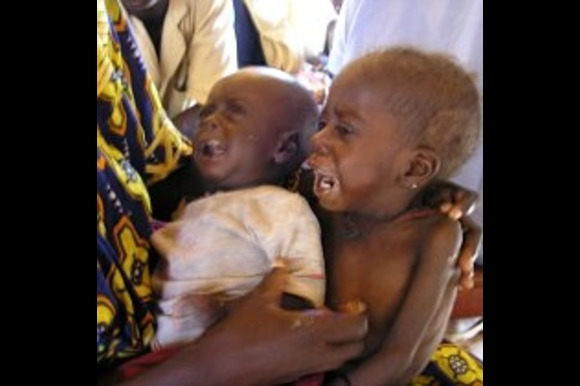JEBEL MARRA, SUDAN — In the midst of Sudan’s devastating civil war, there remains a rare pocket of calm and vitality high in the Jebel Marra mountains. Here, women draped in vivid fabrics and wearing plastic sandals mount their donkeys each morning, children by their side, to tend fertile fields brimming with crops — a striking contrast to the hunger gripping much of the nation.
A Fertile Oasis in a Starving Country
Blessed with a Mediterranean-like climate and rich volcanic soil, the farmers of Jebel Marra cultivate peanuts, oranges, apples, and strawberries — produce that is now almost impossible to find elsewhere in a country facing one of the world’s worst food crises. Before the conflict, Jebel Marra’s organic oranges were especially renowned for their sweetness and juiciness.
Today, while much of Sudan teeters on the brink of famine, the green peaks of Jebel Marra remain a rare symbol of abundance. Yet even here, survival is fraught with difficulty.
Feeding the Fields but Starving the Market
“We almost give them away for free — sometimes we just throw them out because they rot before reaching market,” says Hafiz Ali, an orange seller in the mountain town of Golo.
The problem is not production but access. Poor roads, insecurity, and blockades have made it nearly impossible to transport produce out of the mountains.
Jebel Marra is the last stronghold of the Sudan Liberation Army-Abdulwahid (SLA-AW), a rebel group that has remained neutral in the current conflict. For more than two decades, it has controlled what locals call the “liberated areas,” refusing to sign any peace deal with Khartoum since the Darfur war of 2003.
A Region Isolated by War
Now, surrounded by fighting, Jebel Marra’s isolation grows daily. To the west and north, the Rapid Support Forces (RSF) and allied Arab militias have sealed major routes. To the south, RSF positions face near-weekly bombardments from Sudanese government aircraft, strikes that also kill civilians. The RSF control the east, leaving the highlands encircled.
As a result, farmers and traders can no longer reach national markets in cities like el-Fasher, 130km (82 miles) away, or Tine near the Chadian border, 275km (170 miles) distant.
Makeshift Markets and Risky Journeys
Tawila, on the edge of SLA-AW territory, has become a refuge and a trading post for thousands fleeing from el-Fasher. But it is a dangerous lifeline. Because goods cannot move further, supply gluts have crashed prices. Some traders attempt to smuggle produce into besieged el-Fasher — a perilous, often deadly endeavor.
“To drive just 12 kilometers through the mud and mountains takes a full day,” says Yousif, a fruit vendor in Tawila. “And now with the insecurity, it’s even worse.”
Fragile Peace and Limited Trade
In Central Darfur, a recent truce between the Fur ethnic community and Arab nomads has allowed partial reopening of local markets. In Nertiti, under SLA-AW control, Fur farmers and Arab traders cautiously exchange fruits, vegetables, and dairy products.
“The market opens only once a week. Travel is still dangerous,” says one merchant. “Armed robberies still happen, even with the agreement.”
Further east in Zalingei, the capital of Central Darfur state now controlled by the RSF, trade continues under constant threat. Arab militias allied with the RSF have been accused of harassing and assaulting civilians, allegations they deny.
Checkpoints, Extortion, and Fear
Each Thursday — market day — travelers face a gauntlet of up to two dozen checkpoints between Nertiti and Zalingei. Some are manned by RSF soldiers, others by loosely organized militias.
“One man with a gun might stop you, ask for money, and you have to negotiate while everyone in the car sits silently,” recalls a driver.
Even within SLA-AW territory, armed men manning checkpoints demand “fees,” inspect bags, and confiscate banned items such as skin-lightening creams, which are popular elsewhere in Sudan.
Refuge in the Highlands
Despite its isolation, Jebel Marra has become a sanctuary for thousands escaping the violence raging around el-Fasher. Truckloads of displaced people arrive daily, filling schools, clinics, and abandoned buildings. But humanitarian aid rarely gets through the dense web of checkpoints.
In Golo, the de facto capital of the SLA-AW zone, a woman who fled from el-Fasher described her new life in a crowded classroom now housing 25 families.
“We have no jobs, no income. I used to be a nurse and I can farm, but the land here already belongs to others. We don’t know what to do,” she says, her voice trembling as malnourished children cry nearby.
At least for now, she adds, there is one small comfort — food that cannot leave the mountains remains available locally.
A Peaceful Island in a Sea of War
Jebel Marra stands apart — a world of waterfalls, fertile valleys, and frightened refugees. Its fruit vendors, like its farmers, live caught between bounty and despair.
“We’re not part of this war,” one orange trader says, shaking his head. “We just want to sell our oranges.”






